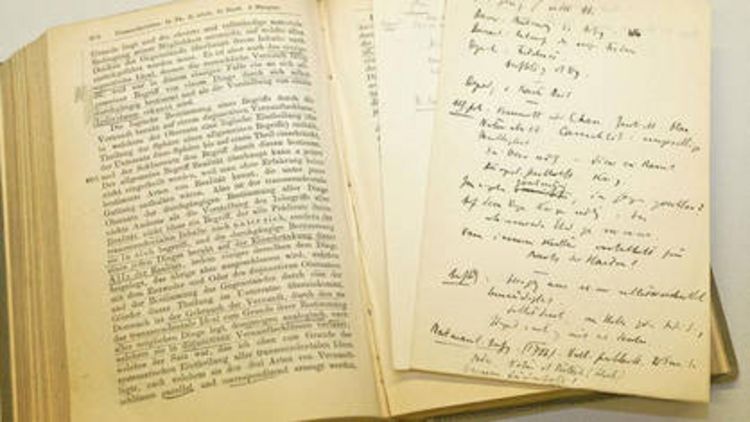The Joint Science Conference (Gemeinsame Wissenschaftskonferenz - GWK)“ of the Federal Government and the Länder gave the green light for the project "Commentary and Complete Edition of the Works of Karl Jaspers as well as an Edition of Selected Letters and Unpublished Works" in November. The project is designed for an 18-year period and is to encompass more than 50 volumes. Work on the complete edition will begin in 2012 at the Universities of Heidelberg and Oldenburg under the direction of the Heidelberg Academy of Sciences and Humanities in cooperation with the Karl Jaspers Foundation in Basel.
This is the crowing achievement of a process that began some time ago and encompasses the "Karl Jaspers Lectures on Questions of Time" (since 1990), the "Year of Jaspers" marking Jaspers' 125th anniversary (2008), the purchase of Jaspers' private library (2009), the German Research Foundation's granting of funding for a Heisenberg Professorship (2011) as well as the purchase and renovation of a Karl Jaspers house.
Karl Jaspers was born on 23 February 1883 in Oldenburg. He first studied law in Heidelberg and Munich and then went on to study medicine in Berlin, Göttingen and Heidelberg. In Heidelberg Jaspers first worked as a psychiatrist and psychologist and then took on a post as professor of philosophy, becoming one of the most renowned philosophers of the 20th century. After the Nazis expelled him from the university administration (1933), forced him to retire (1937) and banned the publication of his works (1938) he was finally reappointed to his university posts in 1945. In 1945 he was offered a chair at the University of Basel, where he died in 1969. Now he is making a posthumous return to the site of his first scholarly activities, Heidelberg, and the place where he grew up, Oldenburg.
Among the editors working on the project, which is led by Heidelberg academics Prof. Dr. Dr. Thomas Fuchs (Psychiatry/Philosophy) and Prof. Dr. Jens Halfwassen (Philosophy), are Dr. Hans Saner, Karl Jaspers' last personal assistant, as well as the philosophers Prof. Dr. Anton Hügli (Basel), Prof. Dr. Kurt Salamun (Graz) and Prof. Dr. Reinhard Schulz (Oldenburg).
Following the successful conclusion of the projects on the complete editions of Carl von Ossietzky and Kurt Tucholzky the approval of this major Jaspers project represents a further milestone in humanities research at Oldenburg. With the designation of the Jaspers Haus as the future location of the 11,000 books that comprised Jaspers' private library, the researchers will have access to a unique infrastructure. While the Heidelberg editors will concentrate on Jaspers' clinical and philosophical works, in Oldenburg in addition to the Hannah Arendt Zentrum Jaspers' political writings will be the focus of editorial interest.
Founded in 1909, the Heidelberg Academy of Sciences and Humanities is the science academy of the state of Baden-Württemberg and one of eight German Academies of Sciences. As a non-university research institution it is currently in charge of 21 research projects with around 230 employees.



